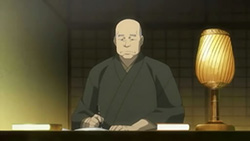 |
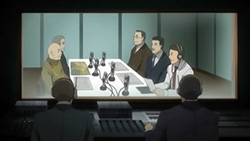 |
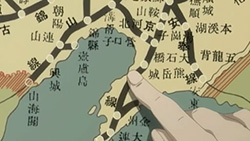 |
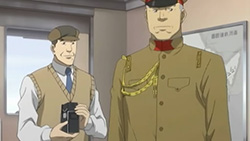 |
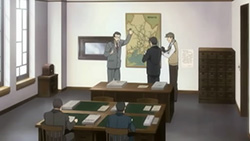 |
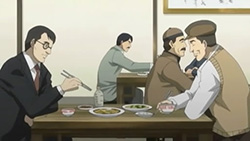 |
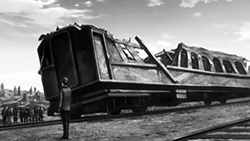 |
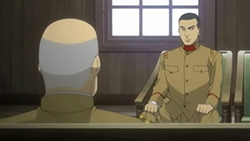 |
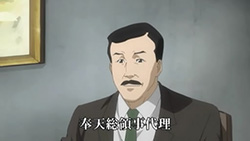 |
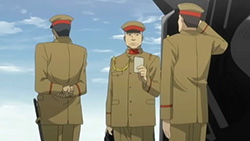 |
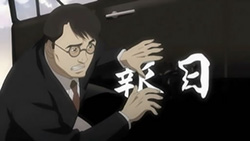 |
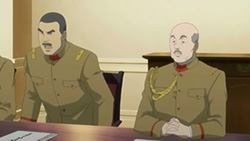 |
 |
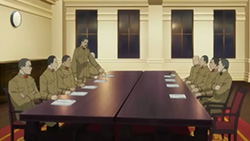 |
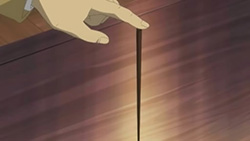 |
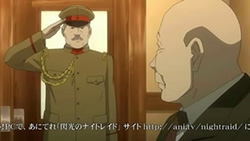 |
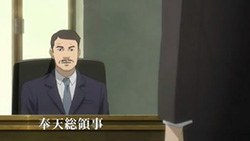 |
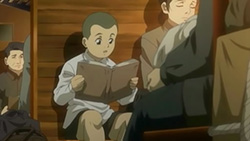 |
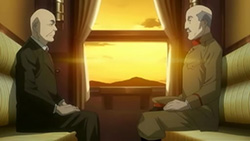 |
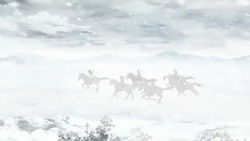 |
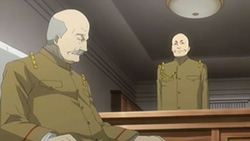 |
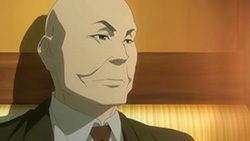 |
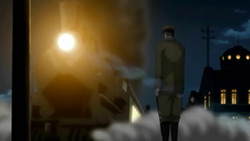 |
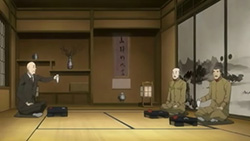 |
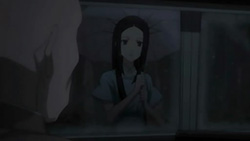 |
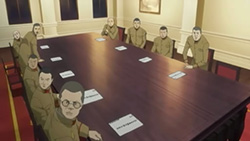 |
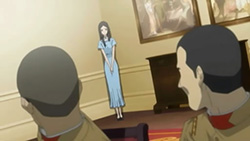 |
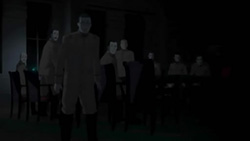 |
 |
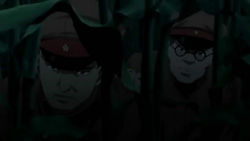 |
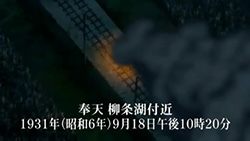 |
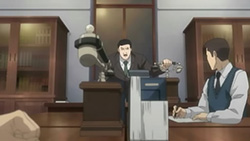 |
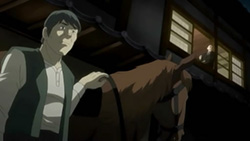 |
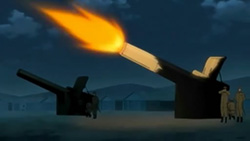 |
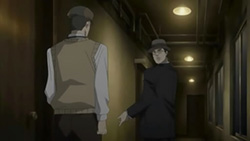 |
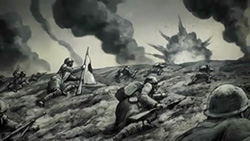 |
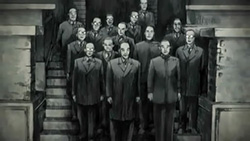 |
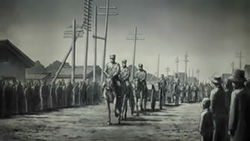 |
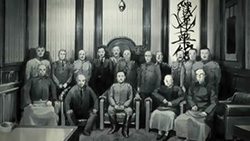 |
「事変」 (Jihen)
“Incident”
I can sort of see why this series isn’t actively fan-subbed, because unless you’re pretty fluent in Japanese, know your Asian history fairly well, and have an inquisitive attention span, it can get a bit difficult to follow at times. In my case, I was never formally taught Asian history in school, so I’m actually enjoying how much I’m learning about it from watching an anime. While I’m aware that some of it is fictional, Anime no Chikara’s depiction of 1931 is surprisingly a lot more faithful to history than one would originally presume (myself included). Part of my so-called history lesson watching this series stems from me cross-referencing what is indeed fact or fiction. It’s a bit of a chore and feels like research, but as someone who’s also actively covering the series, I wholeheartedly believe it’s time well invested.
As I briefly mentioned last time, this online-only seventh episode mainly follows two Japanese Manchuria reporters in their search for a scoop. Noticeably absent were our Sakurai Kikan protagonists, but in their place were a fair number of key historical figures in the telling of the Japanese side of the story leading up to the Mukden Incident. Using a radio show that involved Major General Tatekawa Yoshitsugu among a Constitutional Democratic Party member, a Friends of Constitutional Government member, and a university professor, the episode started off presenting a lot of factual information regarding the Treaty of Shimonoseki that China signed following their defeat in the First Sino-Japanese War. In particular, how China ceded the southeastern portion of Manchuria known as the Liaodong Peninsula to Japan, where the South Manchuria Railway, a.k.a. Mantetsu, is located. Prior to that, there was also a monologue on the importance of the mineral rich and heavily industrialized Manchuria region from a military standpoint, which I assume was foreshadowing why Japan wanted to colonize it.
After this historic foundation of sorts was established, things went on to highlight some emphatic views by having the reporters interview various other people to see if they felt the region was under Japan’s rule. With the existence of the Japanese railway and mention of how the Chinese government wanting to ignore the Treaty of Shimonoseki and build their own railway parallel to it — competing with Mantetsu’s freight business at one-third their rate — it was a good depiction of some of the unrest the Japanese felt about China’s treatment of the region. At the same time, they didn’t shy away from how there were clear signs that Zhang Zuolin (Chou Sakurin in Japanese) was assassinated by the Japanese three years earlier, yet China chose to believe that it was done by spy at the time and not be provoked into a war with Japan. Despite a run-in with Ishiwara Kanji on the train, what our reporters didn’t give us a first-hand account of is what went on behind closed doors. Since personalities generally aren’t documented in history, I can’t really say what the Japanese militarists were thinking leading up to the scheme, but Ishiwara, Itagaki Seishiro, and their men weren’t portrayed as a power-hungry zealous bunch. Instead, they were shown to have heavily contemplated pulling China into a war and ended up relying on the gods to give them a sign using a falling chopstick. Upon seeing that, I was seriously hoping Anime no Chikara wasn’t going to claim that Japan’s decision resulted from a coin toss (more or less).
Naturally, this is where the pure fiction had to kick in since we can only really speculate what ultimately prompted their decision and if it was indeed a power-hungry one to begin with. To that end, they ended up revealing that the chopstick did fall to the left, meaning the military officers wouldn’t go ahead with the plan to bomb their own railway. However, the mysterious encounter Ishiwara, Itagaki, and Tatekawa all had with Aoi’s lover ultimately changed their mind. Believed to be a prophet (she’s now listed as that in the credits too), Senkou no Night Raid basically attributes the Japanese Kwantung Army‘s decision to go ahead with the plan to her appearance, even though she didn’t guide them one way or the other. Humorously enough, they still believed she was a prophet for appearing and disappearing in a blink of an eye, when she was clearly struggling with the door while trying to leave. It felt kind of wrong to laugh at the satire added to this pivotal point in Asian history, but perhaps making fun of it is the best way to offset all the controversy surrounding it. Prophet aside, Isao was also shown earlier on to be on with Ishiwara earlier on, cementing his fictional role in all this.
With that said, the inclusion of Tatekawa did adhere to historical facts by showing how he was sent to check up on the Kwantung Army after headquarters suspected that they might be thinking of defying orders and plotting to start a war. A subtle difference there is that he wasn’t ordered to try and stop them, but merely report back his findings. As a touted hero for his deep reconnaissance missions during the Russo-Japanese War, Tatekawa was shown to be torn between ideals and his orders after our prophet approached him and pointed that out. Subsequently, he was then shown drinking at a hotel with Ishikawa and Itagaki and sensing they were planning something, but choosing not to do anything. In actual history, he was reported to have gotten drunk and fallen asleep instead of stopping Ishikawa and Itagaki, but here he’s depicted as making a conscious effort not to. In any case, it kind of bothered me how one of the reporters immediately decided to report it as an incident caused by the Chinese simply because it would make for a better article to Japanese readers. It basically reiterated how the media can completely mislead the general public with ease, and I don’t doubt that it probably happened either, which is why it was somewhat annoying to see.
Following the bombing, the rest played out as history indicates with the Japanese responding out of “self-defense” and the Japanese government eventually going along with the war, despite how a few members of the Kwantung Army defied orders and acted alone. The rest as they say is history, so I commend Anime no Chikara for portraying things in such a way that Japan is clearly responsible, but isn’t a tyrannous country like some people like to believe. This way, the story’s slightly more acceptable by both sides of the debate and no one’s going to demand that Anime no Chikara be burned at the stake for producing this series. Next time, it looks like we’re back on track with the Sakurai Kikan, so it’ll be interesting to see what role they play in this fictional history after the incident.
Finally, I should mention that there was a commercial for the first BD/DVD release during the stream, indicating that it will include the director’s cut of the first episode and the episode zero prologue on the ship, both of which we saw scenes of in the special chapter.
Preview
 |
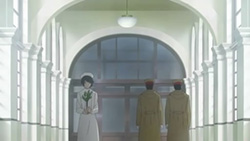 |
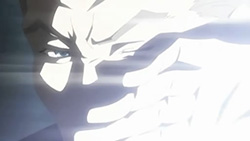 |

“…for portraying things in such a way that Japan is clearly responsible, but isn’t a tyrannous country like some people like to believe”
Haven’t really been keeping up with the series, but I’ll be curious to see if they really do straddle this line or not. My main reason for not really watching this series is, to me, it still seems to try and justify Japan by playing it as a battle of China vs. Japan. While this was a driving factor for what occurred, it seems they’re kind of avoiding mentioning the other countries that got kicked around in that fight. Take for example Korea, who pretty much got invaded by Japan during the First Sino Japanese War (one of the major reasons for that war was securing Korea away from China), had their Queen assassinated a few months later by the Japanese, got “colonized” 15 years later, and faced a “cultural genocide” as many scholars put it now. I’m not expecting a lot of focus on the smaller nations involved, but completely omitting it seems disingenuous to me since it speaks of how manipulative this fight between China vs. Japan became and how it affected not only the millions in those two countries, but the continent in general.
They don’t really go into detail about the incidents that took place in other countries, but they did show some of their involvement in the Pan-Asianism movement back in episode six. While I agree it’d be a lot more interesting to see what their take is on the acts in other countries such as Korea, whose colonization they did made mention of in some episodes, realistically it would be way too much material to cover in a one cour (13 episode) series.
How did you get screens for this episode, it was online wasn’t it? I was worried they might not be very faithful to history in this episode but it sound like they’ve done a fine job with it. Do you have a link for the site to watch it?
Blaineo, please check your e-mail.
Ooooh, Awesome! Thanks!!
hey there divine can I get the site where you found the real episode 7 ^_^
I wonder if they will continue the series with our A-team eventually facing the horrors of escalating war? Maybe even going renegade (and being eraed from history as punishment?)
I am terribly unhappy about lack of subs on this one as history my fave interest in RL.
Well, I’m curious as to what’s going to happen next.
By the way, Divine, it seems that the summer anime list is out.
http://chartfag.files.wordpress.com/2010/05/summer-2010-v1export.jpg
Thanks for the heads-up, but I’ve already done a quick once-over of the new season based on MOON PHASE‘s listing. I haven’t started working on the actual summer preview just yet, but hope to have it out earlier than Omni generally did. I’m just having difficulty finding time to do so between my current shows, work, other real life priorities, and sleep. Ah sleep…
I will say that Ookami-san to Shichinin no Nakama-tachi is definitely one to keep an eye out for though. There are also the sequels to SEKIREI and STRIKE WITCHES that I’ll be watching for sure.
Cool, though judging by the amount of time you seem to spend on this blog, you probably should sleep a bit more…
Sadly, the Moon Phase list is more or less ancient Greek to me, and any attempts to google translate it leaves me with things like:
“Behind most of the Great Satan” and the amazing “Cinquefoil rehearsal shop”
I manage to watch this episode thanks to a special someone from MAL.
Anyone, I like to see how will Aoi and gang play on this. Plus, his girlfriend really have big role on this story. I wonder why she let Aoi think that she died.
I really doubt that the Japanese Government didn’t want war with China: It was a vast country with resources and weak government who had lots of internal enemies.
Some said that they were planning the war as well, only that they want the Chinese to start it as they were not sure how the league of nations and the major players in Global politics would respond. Of course, it was the Kwantung army which came up with the ingenious plan of faking an incident. The sending of Tatekawa to ensure that the Kwantung army behave themselves however, sounds more like a safety mechanism to wash the central government off the folly than to bring the army under control.
The Central government played the game of international politics well. Should the League of Nations and Major Players such as America and the Britain responded forcefully rather than simply sending statements condemning the acts, they only needed to execute the few Kwantung Army officials to calm things down. Facing few if any pressure form the League of Nations as it happened in the History, they simply carried on to wage a full war against China and later on capturing many western colonies in the region (Hongkong, Singapore, Indonesia to name a few).
So the west has themselves to blame as well. If they had reacted at the incident, the anti military sentiment within Japan might have grown and Japan might not went down the route they did during WWII and the fight on pacific might have been avoided totally. But if that was the case, the nations of Asia (especially Korean and the South east Asia countries) could still well be under Japanese influence now.
It seems like they conveniently left out the part where China had to cede Taiwan along with its neighbouring islands such as Kinmen and Matsu , since it was the only area where the Japanese stil had to fight to secure complete control over Taiwan after some Chinese officials declared Taiwanese independance from Japan after the signing of the Treaty of Shimonoseki….
Didn’t really paid much attention to this series until a date caption on one of the screenshots caught my eye – September 18, 1931. I knew immediately what that refers to and came in to have a look.
I’ll just comment on some of the historical stuff.
Under the pre-1947 Imperial Meiji Constitution, the civilian government has scant control over the military, who had a major say on who should be in the cabinet.
It was known that civilian Prime Ministers during that period like Wakatsuki Reijirou and Inukai Tsuyoshi were not in favour of war, as they were eager to court some of the moderate non-hostile Chinese into the East Asia Prosperity Sphere using soft diplomacy rather than the Army’s in-your-face Borg-like “Resistance is futile” approach.
Of course, the military would have none of that, so Wakatsuki was ousted while Inukai was downright assassinated. And after Inukai, all PMs until 1945 were pro-army figures. And any attempted goodwill Wakatsuki and Inukai had in plan for the Chinese went down the drain for good.
http://en.wikipedia.org/wiki/Wakatsuki_Reijir%C5%8D
http://en.wikipedia.org/wiki/Inukai_Tsuyoshi
The local warlord for Manchuria, Zhang Zuolin, was sponsored by Japanese, while the Chiang Kai-shek KMT government was sponsored by the Soviets. (As part of the Soviet deal, they had to co-opt Mao’s Communists into the KMT at the beginning. Though he later purged them, though the damage was done and the rest is history. )
As Chiang’s army moved north towards Manchuria, the Kwangtung Army was dismayed that Zhang was constantly losing, and so resorted to assassinating him and then take direct control of Manchuria for themselves. But they did not expect Zhang’s relatively young son Zhang Xueliang to quickly take over and pledge allegiance to Chiang’s government in Nanjing. So the Kwangtung Army had to resort to this Plan B in taking over Manchuria, which took them nearly 3 years.
BTW, this isn’t the first animation to depict the Manchuria Incident. Many years ago, I saw an Adventures of Tintin cartoon episode, where Tintin actually witnessed the Kwangtung Army rigging the train bomb.
You’re thinking about “The Blue Lotus,” I actually do have the actual comic sitting at home. It was probably Herge’s first very serious story for Tintin that was rooted in hard fact instead of stereotypes and patronizing depictions (like Tintin in America and its portrayal of Native Americans).
Finally got my hands on some proper subs.
https://randomc.net/image/Senkou%20no%20Night%20Raid/Senkou%20no%20Night%20Raid%20-%2007%20-%2029.jpg
“Humorously enough, they still believed she was a prophet for appearing and disappearing in a blink of an eye, when she was clearly struggling with the door while trying to leave. It felt kind of wrong to laugh at the satire added to this pivotal point in Asian history, but perhaps making fun of it is the best way to offset all the controversy surrounding it”
That moment was quite gold for not foreseeing how to open the door. xD